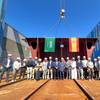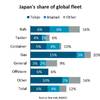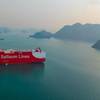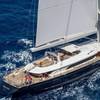W&O: An Engineered Ascension
In today’s rapid-paced industrial environment, companies that stand still will more than likely get trampled. David Turner, W&O’s president and CEO, realized this many years ago, and the company known for providing pipes and valves for the commercial and naval shipbuilding markets embarked on the path to provide engineered solutions. W&O Supply was founded in 1975 and by its own estimation is the largest marine piping supplier in the U.S. It boasts a wide customer base representing all aspects of the maritime industry, including the U.S. Navy, commercial shipping companies, barge owners, cruise companies and shipyards all across North America and Europe.
Up until the early 1990s the company was know for its supply of mostly commodity type equipment, mainly manually operated gate valves. Seeking growth in an ever-tightening maritime market, the company shifted gears toward becoming an engineered solutions provider. Instead of providing shipyards single pieces, W&O started providing complete manufactured systems.
Along the way, a number of deals were struck and companies acquired, perhaps none more key than the acquisition of Valve Automation Control, which helped to quickly expand the engineered solution/added value approach.
“We helped the shipyards evolve toward the lean manufacturing process,” said Turner, explaining that where as the shipyards used to bring all components – valves, actuators, brackets, etc. – in house for final assembly and testing, today W&O manufactures the complete set up and delivers it, fully tested and approved, for installation.
While the newbuild yards have profited handsomely with reduced manhours and better quality control, the process of helping to streamline its shipyard customer’s business actually started in the ship repair yards. Ship Repair yards many years ago recognized the need to exit from the warehousing business, and companies such as W&O were critical in implementing this strategy. Turner explained that his company would sit down with customers to help develop a processes flow chart, and some yards took the efficiency a step further by adoption W&O’s part numbering scheme. While there are far too many projects to mention, perhaps the company’s work aboard the TOTE ships built at NASSCO best exemplifies the companies direction and capability.
Projects at Nassco
Valve Automation and Controls, a wholly owned subsidiary of W&O Supply, proved the value of adapting existing technology to new uses aboard a series of 840 x 118 ft. RoRo cargo ships built by National Steel and Shipbuilding Co. (NASSCO), which is owned by General Dynamics, for Totem Ocean Trailer Express (TOTE).
The risk: switching from hard-wired electrically controlled valve systems in sea-going vessels to a computer-based digital system. National Steel and Shipbuilding Company (NASSCO), builds support vessels for the government and commercial ships. According to Cal Cardiff, VAC´s Chairman, the hard part was talking General Dynamics into trying the digital system.
One advantage of the digital control system is that it can incorporate a large number of valves in a continuous loop, an enormous saving in labor and wiring over the electrically-controlled systems which require individual wiring for each valve. Another advantage is that the computer-based digital system can monitor and provide much more information on each unit in the loop. The first ship top carry the system – TOTE’s M. V. Midnight Sun, the first of two new Orca-class trailerships delivered in 2003 – successfully passed all tests, and is significant as it is the first digitally controlled valve network on a U.S. built ship. The innovation is featured on another series of NASSCO-built vessels, the four British Petroleum double-hull oil tankers, also built by NASSCO, as well as up to 12 U.S. Navy supply vessels designed to carry fuel, munitions and dry cargo (TAKE), Turner said.
According to Turner, the advantage is particularly pronounced in the BP tankers, as there are more than 300 valve systems in each ship, and up to 325 per TAKE ship.
“Our goal was to take their (Valve Automation & Control’s) expertise and sell it throughout the rest of our branch network,” Turner said. While W&O has recorded phenomenal growth, it is hardly resting on its laurels, with a new five-year business plan in place to concentrate on the domestic maritime business opportunities and further expand the engineered product line. “But we will be picky,” Turner said, opting only for those technologies that complement the company’s line and direction.
In addition to an expected uptick in the cruise business, Turner sees the offshore market as ripe for W&O, mainly as the company has not traditionally been a player in the market as it was viewed more as oil and gas rather than marine business. That view is changing, and Turner expects good penetration in the coming years.















